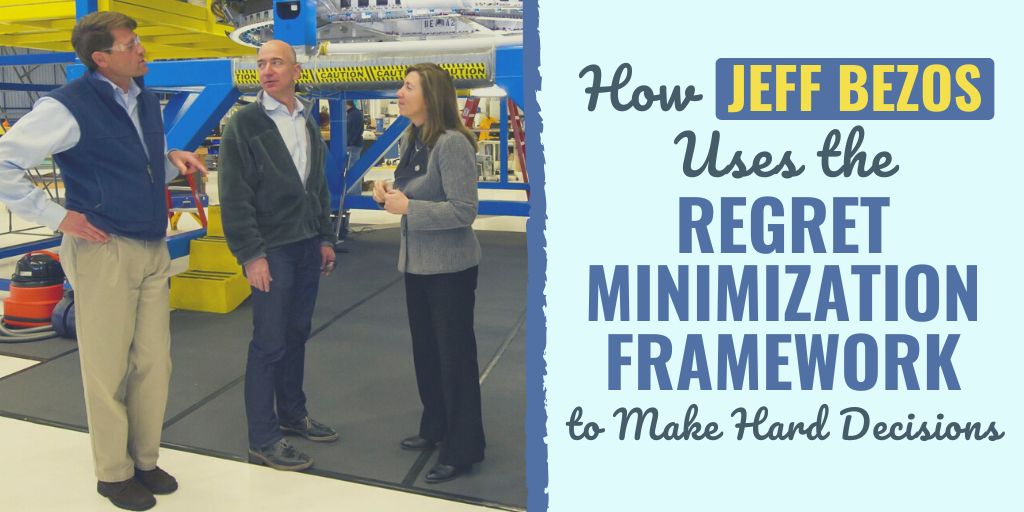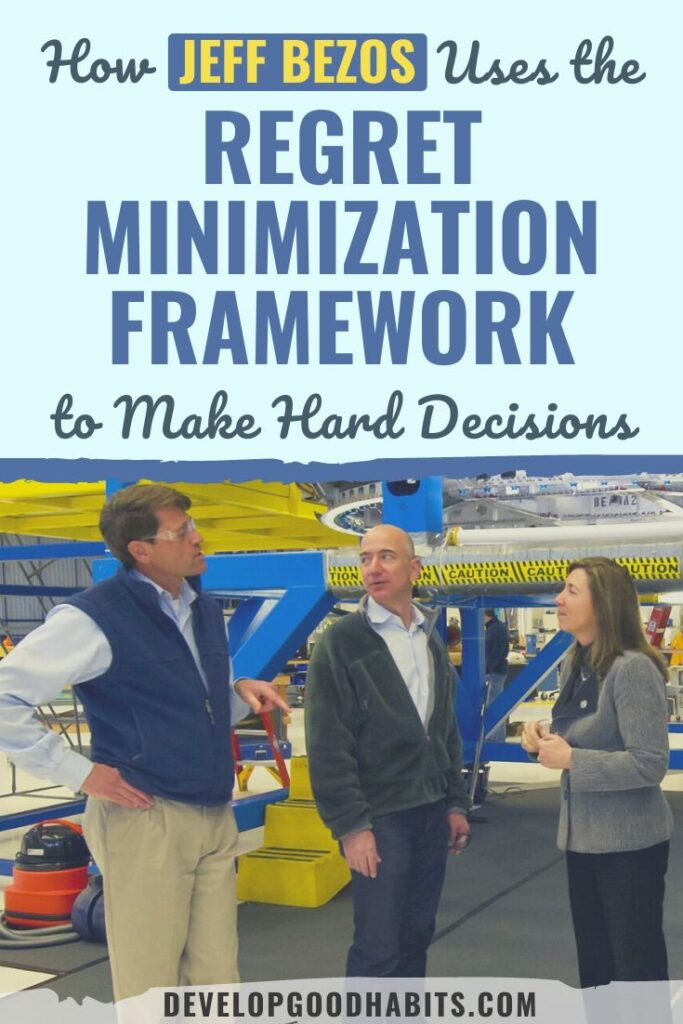Think about the last time you made a decision.
But not just any decision–one that involved a pretty significant trade-off one way or another.
For me, it took me about five years to make the hard life decision to quit my very comfortable (yet unrewarding) job and go back to school to get my master’s degree in social work.
On one hand, I could take the easy way out and choose the path of least resistance by staying at my job. After all, I didn’t dislike my job, I was good at what I did, and I had great co-workers.
But on the other, it wasn’t adding much meaning to my life and I knew I wasn’t making a big difference in the world. I was kind of just…existing.
Now, if I were Jeff Bezos, the founder of Amazon, my five year-long decision would have taken just 48 hours to come to a conclusion by using the regret minimization framework.
Before we proceed, if you prefer to watch instead of read, below is the video summary of this article:
In this article, I will talk about this mental model that you can use to make your own decisions.
I will explain how the regret minimization framework works and go over a few lessons you can take away from Bezos’s method of thinking that can be useful in your life.
What Is the Regret Minimization Framework?
Before we get into what this mental model is, let’s take a look at the story behind it.
In 1994, Jeff Bezos was living comfortably in New York City, working at D. E. Shaw & Co., a worldwide investment management and technology development firm.
However, he had an idea.
The internet was becoming increasingly popular at the time, and Bezos thought it would be a good time to penetrate the online market in some way.
So he approached his boss with the idea of selling books online. In response, his boss told him to take 48 hours to really think about it, as Bezos was already successful in his current career.
He took the time suggested by his boss to contemplate his decision. It was the middle of the year, so quitting his job now would mean giving up his annual bonus. However, what if it was the best time to jump into online sales before the market becomes saturated?
Herein lies the trade-off.
At this point, Bezos decided to adopt a mental framework of “regret minimization”. He did this by envisioning himself at 80 years old looking back on his life. What could he do to minimize his chances of living with regrets?
He decided that if he tried and failed, he wouldn’t regret it; however, if he didn’t even try, he would most definitely regret his decision. As Bezos put it:
“I knew that when I was 80 I was not going to regret having tried [participating] in this thing called the Internet that I thought was going to be a really big deal. I knew that if I failed I wouldn’t regret that, but I…might regret [not trying].” – Jeff Bezos
Luckily for Bezos, his decision paid off and his judgment to follow this specific mental model was extremely successful.
The framework Bezos used required him to ask himself one question: “When I’m 80, am I going to regret trying this?” And if you choose to use this mental model as well, you will be asking yourself a similar question.
Like it did for Jeff Bezos, asking yourself this question can help you turn a seemingly difficult decision into a simple one. As he said, “I knew that [not trying] would haunt me every day, and so, when I thought about it that way it was an incredibly easy decision.” – Jeff Bezos
In case you’re still wondering what a mental model is, let’s take a look.
What Exactly Is a Mental Model?
Mental models are various methods in which people choose to perceive the world to assist in making daily decisions.
These models guide one’s decision-making process to ensure their ultimate choice is supported with the knowledge that comprehensive consideration was put into all possible options.
It’s hard to dispute the results of a decision after putting this amount of work in the books, no matter what outcome that decision may bring.
If you jump straight into making a decision, you’re focusing only on the potential outcome of your decision rather than challenging your process of coming to that conclusion.
Without following his mental model, Bezos may have gotten stuck on some minor details of his choice, such as the short-term consequence of giving up his annual bonus.
However, when he projected himself into the future and looked back on this decision with a new perspective, that potential factor of confusion became irrelevant.
Now, let’s take a look at some of the lessons you can take away from Bezos’s regret minimization framework.
Lessons from the Regret Minimization Framework
1. Think Beyond Right Now
Using the regret minimization framework forces you to think past the present moment. It can make all of your current fears and doubts become seemingly irrelevant in the long run.
Instead, by fast forwarding your mindset into the future, you’re able to assess things from a greater perspective, which can help you see the decision from a whole new vantage point.
2. Live Your Life True to Yourself
If possible, don’t become tied down to the life that other people expect you to live. If you come from three generations of lawyers, that doesn’t mean that is your required destiny also.
Instead, remain true to your values and ideals and chase after your dreams as much as you can. It’s important to live your own life rather than someone else’s.
Pursue the things that actually matter to you instead of what other people tell you “should be” important to you. Consider your passions and the causes that you care about. Once you can determine these, organize your life around them. Living in line with your values will help you achieve true happiness.
3. Don’t Set Yourself Up to Have Regrets
Before Jeff Bezos, there was Bonnie Ware. This Australian palliative nurse published a book in 2012 documenting what she found through her own research to be the top regrets of her dying patients.
Ware found that the most common regret among people at the end of their lives was leaving their dreams unfulfilled. Most of Ware’s patients reportedly left over half of their dreams unattempted and finished out their lives knowing their biggest regret was due to their own lack of action.
Minimizing this sense of regret by pursuing your dreams while you’re still in good health is more valuable than you may realize until you no longer have the chance.
4. Living a Mediocre Life Won’t Result in Fulfillment
When it comes to making the big decision of abandoning your current comfortable situation in order to pursue an uncertain path, you will likely have a variety of doubts:
There is no doubt these questions are scary. But remember, they’re all stemming from a short-term frame of mind, which is what Bezos was able to move past.
Altering your mindset to consider your potential future regrets helps you look beyond potential hiccups and forces you to address the more important question of, “What will happen if I don’t quit?”
Instead of thinking about what could go wrong in the next year or two if you follow through with your big decision, try projecting yourself into the future and think more about what you could miss out on in the next 20+ years if you don’t take the necessary steps to follow your heart.
Starting on a new and uncertain path is hard, there’s no doubt about that. But it’s a different type of “hard” than settling for your current mediocre situation. It’s a challenge that comes with a potential reward.

Your aspirations may not be in the same vein as those of Jeff Bezos, however, your personal ambitions may be of a similar caliber–whether that’s toward a lifelong dream of achieving something no one has ever done before, or it’s a more general intent of living a more creative lifestyle.
The potential of feeling some sort of regret in the future is a great motivator to chase after your dreams.
When you’re in the final season of your life, are you more likely to dwell on your regrets, or measure your success by the courage you had to act upon your unique wishes for life?
A Word of Caution: Questions to Ask Before You Quit Your Job
The Regret Minimization Framework is a very effective method for making important decisions that help avoid regret in the future, but it’s possible to get a bit carried away with this method of thinking.
Remember, this mental model can be used for things besides leaving a job (Should you end your long-term relationship? Should you pack up your life and move to another country? Should you buy this house?) but let’s stick with the example at hand for simplicity’s sake.
Let’s say you hate your job and you want to start your own business. According to this framework, you should quit your job right away and open a business to minimize the chance that you’ll look back on your life when you’re older and regret wasting so much time in a miserable job.
But if you aren’t financially stable and you don’t have a plan, you’re likely to regret walking out on your job too soon. So before quitting your job prematurely in an effort to minimize feelings of regret in the future, consider the following questions:
1. Do you have to make a drastic change to minimize regret?
There may be some other options, such as:
There are ways to improve your current situation without quitting with no resources in place to hold you over while you’re getting started on your new venture.
This isn’t to say that now is not the right time to pursue entrepreneurship full time, you just want to make sure you have your ducks in a row.
2. If you decide to quit your job, do you know how to earn money in other ways?
If you want to open an Etsy store and sell your craft full time, have you been able to earn some money doing this in the past?
Becoming an entrepreneur full time in a field that’s new to you at the cost of giving up your stable employment is most likely going to be a bad idea.
If this is the case, you don’t know how long it takes to start making a profit, obtain and maintain clients, enact systems to ensure a smoothly run operation, etc.
It’s a more constructive idea to work out these kinks before giving up the income to which you have become accustomed. If you do this, you won’t be putting yourself into a situation where you have to start earning money right away to prevent yourself from ending up in a bad financial situation.
Figure out how you can make money doing what you want to do, and then free up your time by quitting your job so you can consistently grow your income.
Hold back from the temptation to dive headfirst into a field in which you have very little experience unless you have the resources to tide you over. Which leads me to…
3. Do you have savings to support yourself?
It’s not a smart financial decision to quit your stable job if you don’t have any money saved up, as this puts a lot of pressure on you to start earning a profit right away.
A more realistic plan is to have enough cash saved to support yourself for about a year while you’re figuring out how to earn a sufficient amount of money from your new income source.
If you have sufficient savings, you will be afforded the confidence boost that you need to make this dramatic job switch without being nervous about the prospect of running out of money.

It’s easier to focus on running your own business if you’re not overly concerned about being able to pay your bills each month.
All this to say, while the Regret Minimization Framework can be an effective method of avoiding future regret, you still have to be realistic about paying your bills.
Have the courage and willingness to pull the trigger on making this hard decision, but it’s best to be (at least somewhat) confident that the time is actually right.
So while considering your potential regrets later in life, don’t neglect to consider your current competence level, the right timing, any relevant environmental factors, and other important elements.
While you don’t necessarily have to wait for “ideal” conditions, you need to know how to stay flexible.
Final Thoughts on the Regret Minimization Framework
No single mental model is right for everyone, so you have to find what works best for you in whatever situation you’re facing. In order to do this, you need to understand your values and how you perceive the world.
Having a variety of mental models in your toolkit is an essential part of being able to make good decisions for yourself. However, it’s always important to be realistic.
Don’t quit your imperfect job without having some sort of plan in place or means of alternate support. But, it’s also important to be courageous when you feel like the time is right and take a leap of faith. Living with regret is an extremely unfavorable way to spend your life.
You’re the one who has to ultimately make these hard life decisions. Having external support from friends, family, and your environment is an advantage, but you’re ultimately on your own. You’re the one who is either taking action or staying in a mediocre situation.
It’s impossible to reduce the amount of uncertainty that comes along with making hard life decisions–you don’t always know your odds ahead of time.
However, by using the Regret Minimization Framework by projecting yourself to the end of your life and considering your potential regrets, your decision may become more clear as you’re able to remove a few present factors that add some confusion about taking an alternative path.
Just remember, failure is part of life, so if you do decide to move forward with taking a risk and it doesn’t work out the way you hoped, you need to be mentally prepared to overcome that disappointment.
Finally, for more decision-making help, be sure to check out the articles below:
- The Eisenhower Matrix: Make Urgent vs. Important Decisions with 4 Quadrants
- 10 Free Decision Matrix Templates to Make the Best Life Choices
- 7 Simple Habits to Overcome Paralysis by Analysis
Finally, if you want to take your goal-setting efforts to the next level, check out this FREE printable worksheet and a step-by-step process that will help you set effective SMART goals.

Connie Stemmle is a professional editor, freelance writer and ghostwriter. She holds a BS in Marketing and a Master’s Degree in Social Work. When she is not writing, Connie is either spending time with her 4-year-old daughter, running, or making efforts in her community to promote social justice.


